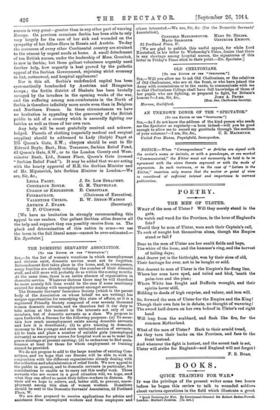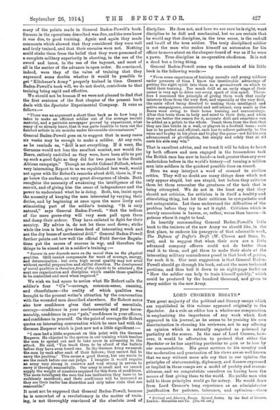BOOKS.
QUICK TRAINING FOR WAR.* IT was the privilege of the present writer some two hours before he began this review to talk to wounded soldiers about various operations in the field which illustrate a great
• Quick Training for War. By Lientenant-General Sir Robert Baden-Powell. London: Herbert Jenkins. fls. net]
many of the points made in General Baden-Powell's book. Success in the operations described was due, and the men knew it was due, to good training. Again and again they made comments which showed that they considered they were well and truly trained, and that their enemies were not. Nothing could shake them from the belief that they were possessed of a complete military superiority in shooting, in the use of the sword and lance, in the use of the bayonet, and most of all in the matter of the advance in open order. So convinced, indeed, were they of the value of training that they expressed some doubts whether it would be possible to get "Kitchener's Army" properly trained in time. General Baden-Powell's book will, we do not doubt, contribute to that training being rapid and effective. We should not be human if we were not pleased to find that the first sentence of the first chapter of the present book deals with the Spectator Experimental Company. It runs as follows :—
"There was an argument a short time back as to how long it takes to make an efficient soldier out of the average recruit material, and a patriotic newspaper proved by experiment, what many of us already knew, that it was quite feasible to turn out the finished article in six months under favourable circumstances."
General Baden-Powell goes on to suggest that in many cases six weeks may be enough to make a soldier. At any rate,
as he reminds us, "drill is not everything. If it were, the Germans would not lose the smallest combat, nor would the Boers, entirely niadrilled as they were, have been able to put
up such a good fight as they did for two years in the South African campaign." Though no doubt Colonel Pollock, whose very interesting Report to ns we republished last week, would not agree with Sir Robert's remarks about drill, there is, if we
go below the surface, no very great divergence of ideals. Both recognize the necessity of awakening the intelligence of the recruit, and of giving him the sense of independence and the power to understand what he is doing. Both, too, insist upon the necessity of keeping the men interested by varying their
duties, and by beginning at once upon the more lively and stimulating part of the soldier's training. "It is only natural," says General Baden-Powell, " that the tedium of the mere goose-step will very soon pall upon them and damp their ardour. They have enlisted to fight for their country. My advice is, do not let them cool down ; strike while the iron is hot, give them food of interesting work and not the dry bones of mechanical drill." General Baden-Powell further points out how well the official Field Service Regula- tions put the causes of success in war, and therefore the things to be aimed at in a soldier's training :—
"Success in war depends more on the moral than on the physical qualities. Skill cannot compensate for want of courage, energy, and determination : but even high moral quality may not avail without careful preparation and skilful direction. The development of moral qualities is therefore first of the objects to be attained ; the next are organisation and discipline which enable those qualities to be controlled and used when required."
We wish we had space to notice what Sir Robert calls the soldier's four "C's "—courage, common-sense, cunning, and cheerfulness—the reality of which qualities was brought to the present writer's attention by the conversation with the wounded men described elsewhere. Sir Robert notes also how confidence gives that essential of essentials, courage—confidence in your marksmanship and your horse- manship, confidence in your "pals," confidence in your officers, and confidence in yourself. On the point of courage Sir Robert
quotes an interesting conversation which he once had with the German Emperor which is just now not a little significant:— "I once bad a little argument on this point with the German Emperor. He objected to the system in our training which teaches the men to spread out and to take cover in advancing to the attack. He said, You teach them to be afraid of the bullets before they have even heard one. In the German Army we march the men by rank after rank of their fellows ; they cannot fail to carry the position.' This seems a good theory, but one wants to see the result before one can judge. I imagine it would require an army very strong in reserves and very strong in nerves to carry it through successfully. Our army is small and we cannot supply the weight of numbers required for this form of confidence. The more intelligent the men the less inclination they have to be ruthlessly sacrificed; and their confidence will be increased as they see their leader has discretion and only takes risks that are reasonable."
It must not be supposed that General Baden-Powell, because he is somewhat of a revolutionary in the matter of train- ing, is not thoroughly convinced of the absolute need of
discipline. He does not, and here we are sure he is right, want discipline to be dull and mechanical, but we are certain that he would say that discipline, in the true sense, is the end-all and be-all of the true soldier. The truly disciplined soldier is not the man who makes himself an automaton for his officer to move about on the chequer-board of war as if he were a pawn. True discipline is co-operative obedience. It is not a dead but a living thing.
General Baden-Powell sums up the ,contents of his little book in the following words :—
"From some experience of training recruits and young soldiers under pressure of time I know the inestimable advantage of getting the right spirit into them as a groundwork on which to build their training. Too much drill at an early stage of their career is very apt to drive out every spark of this spirit. There- fore I commend the principle of giving them work that really interests them from the very first, and especially at the very first, the main effort being directed to making them intelligent and active campaigners, resourceful and self-reliant, very much as the Boers were owing to their home training and surroundings. After this train them in body and mind to their duty, and when they see better the reason for it, accurate drill and smartness stn be added as a polish to the whole. Teach them from the first that they are like bricks in a wall, or players in a football team : each has to be perfect and efficient, each has to adhere patiently to the rules and to play in his place and to play the game—not for his own advancement or glorification, but simply and solely that at all costs his aide may win."
That is excellent advice, and we trust it will be taken to heart by both officers and men engaged in the tremendous task the British race has now in hand—a task greater than any ever undertaken before in the world's history—of turning a million men into soldiers in the quickest possible time on record.
Here we may interject a word of counsel to civilian critics. They will no doubt see many things done which not only appear stupid, but are stupid, but before they criticize them let them remember the greatness of the task that is
being attempted. We do not in the least say that they should not criticize, for criticism is in itself a healthy and
stimulating thing, but let their criticism be sympathetic and not antagonistic. Let them understand the difficulties of the problem before they try to set it right. Criticism which is merely censorious is barren, or, rather,Worse than barren—it poisons where it ought to heal.
In heartily commending General Baden-Powell's little book to the trainers of the new Army we should like, in the first place, to endorse his panegyric of that admirable work,
The Defence of Duffer's Drift (W. Clowes and Sons, ls. net), and to suggest that when their men are a little,
advanced company officers could not do better than read it to them, and get them to make their shots at the interesting military conundrums posed in that book of genius, for such it is. Our next suggestion is that General Baden- Powell should go through his book, cut out the more technical portions, and thus boil it down to an eight-page leaflet on "How the soldier can help to train himself quickly," which could be produced by the hundred thousand, and given to every soldier in the new Army.



































 Previous page
Previous page